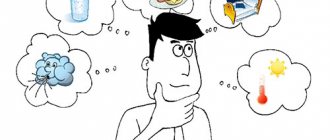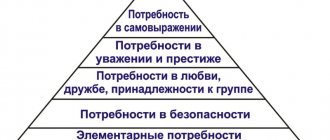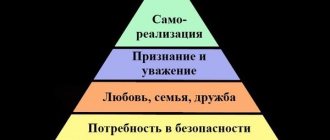In 1943, Abraham Maslow's article "A Theory of Individual Motivation" was published in Psychological Review. His views differed from the popular concepts of psychoanalysis and behaviorism at that time, which were based on the behavior of animals and were speculative. Maslow's theory was based on experiments with people conducted in hospital settings.
In addition, Maslow's research allowed for the first time to formulate a positive view of human nature. Traditional psychology studied people with mental disorders, while Abraham Maslow studied the behavior of healthy and fulfilled individuals. He paid special attention to such manifestations of personality as altruism, love, and creativity.
Introduction
In the previous article, we already mentioned the circumstances under which the humanistic direction arose in psychology. Its important feature was the conviction of its followers that in addition to the basic needs and needs for the realization of animal instincts, any person also has a completely different motivation, as well as the potential for its implementation.
What was meant is that it is impossible to exhaustively describe a person, excluding those of his features that distinguish him from an animal, namely such things as the desire to understand the fundamental issues of existence and the universe, the desire for self-actualization, self-improvement, the desire for creativity and beauty. Moreover, followers of the humanistic movement believed that the desire for the above is immanent in human nature, along with animal instincts.
Among all the humanistic theories and views on the nature of personality and its motives, Abraham Maslow's theory is perhaps the most famous.
Criticism
Many psychologists still criticize the theory of the pyramid of needs. They justify this by the fact that the economic situation at the time the theory was created left much to be desired, so the opinion about the dissatisfaction of basic needs was relevant. Now a person is fed up with various services, and he no longer needs to suffer from a lack of something, he no longer has to survive.
Modern researchers confirm that now a person does not have the same sequence of needs as in the pyramid. It is not at all necessary to receive love first, and then value, and then development. Now motivation has changed a little; there are other motivators that help you achieve success and change. Read more about this in the article.
Maslow Abraham Harold (1908 - 1970). short biography
Abraham Maslow was born in the USA in 1908 into a family of poor Jewish immigrants. Abraham's childhood was not easy due to difficult relationships with his parents and peers. According to his own words later, such a personal story was bound to end with mental problems or even more serious consequences. The boy grew up unhappy, abandoned and lonely, and communication with peers and understanding of his parents were replaced by library corridors and books.
Initially, his father planned his education, so young Maslow goes to college to study law, but quickly realizes that being a lawyer is not his calling. Soon the young man enters the University of Wisconsin, where he receives a bachelor's degree in psychology, and a few years later a doctorate. During his training, Maslow meets Harry Harlow, a famous American psychologist, in whose laboratory he studies dominant behavior in monkeys.
After receiving his doctorate, Maslow returned to New York and remained there for a long time, working at Brooklyn College. During the Second World War, a large number of the European scientific elite fled to the United States from Germany and Europe from the Nazis, including the most famous psychologists of the time, such as Erich Fromm, Alfred Adler, Ruth Benedict and others, and New York at that time became a psychological mecca all over the world, in such conditions the scientific views of a scientist are formed.
Since 1951, Maslow has headed the psychology department at Brandeis University and lectured. The most fruitful stage of his activity dates back to this period; it was at this time that the emergence of a new direction in humanistic psychology took place, with his significant contribution.
In 1969, Maslow unexpectedly left the university and devoted all his time to studying philosophy and economics, and in 1970 he suddenly died of a heart attack.
Background of Maslow's theory
Abraham Maslow's theory of human development is based on the five humanistic principles that were outlined in the previous article on the premises of humanistic psychology. And since the pinnacle of his theory is such a concept as a person’s desire for self-actualization, it is natural that the main question that arises to this idea is what exactly motivates a person who chooses such a reference point in his hierarchy of values. And the greatest number of questions to the new theory of needs arose from the point of view of Freud’s psychoanalytic theory, which, at that time, occupied a very authoritative position in world psychology.
For comparison, Freud's basic desire for man, in addition to satisfying the physiological needs of the body, was to relieve constant psychological stress that arose as a result of the action of the opposition ID - Super Ego. Any personality in such a system was an eternal hostage to this confrontation, which was impossible to completely eliminate from the standpoint of psychoanalysis.
Also, appealing to psychoanalysis, it is necessary to pay attention to the fact that in this system the desire for higher values was determined entirely by the position of the super ego. This meant that, firstly, this desire was acquired through upbringing, and secondly, secondary, since the true, primary needs of a person, according to the teachings of psychoanalysis, were the unconscious aspirations of ID.
In such a system of coordinates there was no place for a higher need, and at the same time not conditioned by the urgent need of the body, there was and could not be. Despite the unprovability of the provisions of psychoanalysis, Freud’s logic was, if not scientifically impeccable, then quite obvious and understandable.
On the other hand, Freud's theory of personality was built mainly on materials from his work as a psychiatrist with people suffering from various psychological problems, often very serious ones.
This was Abraham Maslow's main complaint about psychoanalysis. Quite logically, he believed that it was impossible to construct a correct theory without taking into account the fact that there are not so few mentally healthy people in the world. It is for this reason that supporters of humanistic psychology placed such a significant emphasis on human mental health, and this played such an important role that it became one of the five basic principles of the new direction.
Of course, this did not mean denying the obvious fact of the existence of psychological and mental problems, but it made it possible to look at them from a completely different perspective.
And this perspective was the theory of needs, which occupied a central place in Maslow’s views on the human personality.
It is obvious that in the human world there are a considerable number of people whose goal in life is the realization of their creative and spiritual capabilities and abilities, and, interestingly and unexpectedly, this realization involves a partial rejection (and sometimes very impressive) of the priority of basic needs. In addition, movement in this direction is associated with certain risks and frequent departures from the so-called comfort zone.
So, if you want to do what your calling is, it is not uncommon that you have to choose a rather thorny and difficult road on which people endure a lot of hardships. These facts are well known to everyone, which means that those who choose this path are, at least approximately, aware of its difficulties and dangers in advance. Despite this, there are always such people and there are many of them. It is quite difficult to comprehensively explain their motives from the point of view of sublimation of the basic needs of ID, especially in cases where these basic needs have already been satisfied. And these arguments, of course, awaited their explanations.
Human creative potential
Recognition of the priority of the creative side in a person is perhaps the most significant concept in humanistic psychology. Maslow was the first to suggest that creativity was the most universal human trait that he studied or observed (Maslow, 1950). Maslow (1987) characterized it as an innate quality of human nature and viewed creativity as a trait potentially present in all humans from birth. It is natural: trees produce leaves, birds fly, people create. However, he also recognized that most people lose this trait as a result of "culturalization" (largely brought about by formal education). Fortunately, some people retain their fresh, naive and spontaneous outlook on things, or, if they are among those who have lost this quality, they can regain it over time. Since, according to Maslow, the ability to create is inherent in each of us, it does not require special talents or skills. We don't need to write books, compose music, or paint pictures to be creative. Relatively few people do this. Creativity is a universal human function leading to all forms of expression. For example, there may be creative disc jockeys, programmers, businessmen, salespeople, clerks, and even college professors!
Maslow argued that none of the psychological approaches to the study of behavior gave due importance to the functioning, lifestyle, or life goals of healthy individuals. In particular, he sharply criticized Freud's enthusiasm for the study of disease, pathology and maladjustment. Maslow believed that psychoanalytic theory is one-sided and lacks universality because it is based on the abnormal or "diseased" aspects of human nature (i.e., its flaws and imperfections) and ignores the strength and virtue of man. To address this deficiency, Maslow focused on the mentally healthy person and understood such a person from a different perspective than the mentally ill person. He believed that we cannot understand mental illness until we understand mental health. Maslow directly stated that the study of crippled, underdeveloped and unhealthy people can only lead to a “crippling” psychology. He strongly insisted on the study of self-actualizing, mentally healthy people as the basis of a more universal science of psychology. Consequently, humanistic psychology assumes that self-actualization is a fundamental theme of human life, a theme that cannot be accessed solely through the study of people with mental disabilities. Maslow's humanistically oriented work gained acceptance among psychologists in the 1960s and 1970s. For many, his approach, emphasizing the exploration of joy, love, creativity, choice, and self-realization, proved to be an optimistic alternative to what they saw as mechanistic and dehumanized patterns of human behavior. Although the popularity of the humanistic movement has since declined somewhat, its influence on important trends in the development of psychology and personality theory is still evident. Fields such as counseling, social work, education, nursing, business administration, and marketing are also influenced by Maslow's ideas (Leonard, 1983).
Maslow's pyramid. Hierarchy of needs.
It is quite obvious that first a person has a need for something, and already on the basis of this need an impulse (desire) arises to satisfy it. This is motivation.
One of the main provisions of Maslow's theory is that a person is constantly motivated by something, and there is almost never a state of affairs in which complete satisfaction occurs, and if such situations arise, which happens, it is very short-lived, and very soon the next need arises And so on and so forth.
Summarizing this thesis, we can say that according to Maslow, desires are an integral characteristic of human existence .
Another important part of this theory says that all the needs that underlie motivation are not acquired, but innate in nature, and this initial urge of a person (energy of desire) is simply superimposed on external circumstances, which determine the very object of desire, or direction in which this psychic energy unfolds.
The third important assumption suggests that these aspirations - motivations exist in a hierarchy due to the presence of obvious priorities .
For example, the need for breathing is undoubtedly more primary in importance than the need for food and drink, and the need for communication naturally loses to the desire to be satiated and not die of hunger.
All this meant that desires (desires to realize needs) are HIERARCHICAL.
This is the hierarchy of needs in order of priority proposed by Maslow.
- primary physiological needs of the body. - need for security. - the need for belonging to society and love. - need for self-esteem. - the need for self-actualization.
On the basis of this scale, Maslow’s well-known pyramid of needs was created, according to which the needs of the lower level must be satisfied (albeit not completely, but mostly) before there is at least an awareness of the presence of needs of another level as a necessity. According to Maslow, the higher an individual rose up the steps of this pyramid, the more he realized the human qualities of the individual, and the greater psychological health he should have.
*In our time, only the lazy did not criticize or express their sarcasm about Maslow’s pyramid, however, it should be understood that such an attitude always comes not from great intelligence, but from stupidity. Maslow's pyramid, like any other psychological theory, does not pretend to be mathematically precise in its universality; any such theory is always approximate, but at the same time, it quite accurately describes the behavior of a statistically significant majority. This is the specificity of the psychological approach, in which there are always exceptions
It is quite obvious that there may be exceptions to the hierarchy of motives, and they are quite numerous. The world knows many people who, in the name of high ideas, subjected themselves to hardship, hunger, and even went to their death. On this occasion, Maslow said that some people, due to their individual characteristics, are able to create their own hierarchy of needs , different from the one presented. This assumption was obvious and was in good agreement with the second position of humanistic psychology, which affirmed the thesis of the uniqueness of each individual . Thus, human nature itself spoke of the inevitability of the existence of exceptions in any such theory.
Obstacles to self-actualization
If self-actualization is an innate potential, then why doesn't everyone develop it? Human beings are constantly faced with situations in which they must choose between growth and security. The choice of security calls to ourselves, but only the choice of growth brings us closer to self-actualization. If we think not about the dangers of growth, but about positive drives and the possibility of boredom instead of social approval of what appears to be a safe choice, then our choices will more often move us in the direction of self-actualization. To encourage children to make this choice, parents must have the wisdom to avoid both overprotection (which orients children toward safety) and overapproval (which focuses the child on others' opinions instead of their own experiences). When all goes well, the child discovers that choosing growth offers fun, while choosing security leads to boredom. In less than ideal circumstances, choosing growth seems dangerous, but choosing safety promises approval (Figure 2).
Choosing between security and growth. After Maslow, 1962
This postulate is supported by research that reports lower levels of self-report boredom vulnerability among students with high scores on the Brief Self-Actualization Index (McLeod & Vodanovich, 1991).
Besides this intrapsychic craving for self-actualization, there are other reasons why self-actualization is not common. Higher-order needs develop only when favorable external conditions (such as adequate food and shelter) allow earlier needs to be satisfied. In addition, higher order needs are weaker than lower order needs, so they have to compete with them.
External forces can overshadow our internal motivations more easily than the motivations of animals.
People have more instincts in the animal sense - powerful, unmistakable inner voices that unambiguously tell us what, when, where, how and with whom to do. All we have left are vestiges of instinct. And moreover: they are weak, subtle and elusive; they are very easily displaced by learning, cultural demands, fear, and disapproval (Maslow, 1968b).
To emphasize the weakness of human instincts, Maslow (Maslow, 1955,1965) provided them with the ending -oid, calling them instinctoids. The weakness of higher instinctoid impulses means that sometimes they turn out to be inadequate and do not lead us to full self-actualization.
In addition, people sometimes have a Jonah complex, which means they are convinced that they cannot do something very important and, thus, are prevented from realizing their full potential. Maslow (1976) reproached his students for their lack of desire to make important contributions to the development of their fields of activity. He asked them: “If not you, then who?” He warned that the failure of the aspiration to the highest potential, self-actualization, would leave them deeply unhappy.
CATEGORIES OF NEEDS ACCORDING TO MASLOW
1. Physiological needs.
This is a series of needs that are directly related to the needs of the physical body and its immediate survival. Without their satisfaction, the individual quickly develops serious problems that threaten health and even life. This is the need for air, water, food, sleep, favorable climatic conditions, physical activity, as well as stimulation of sensory activity (sense organs). It is clear that until these needs are met, talk about the next level, in most cases, will not arise. It is also clear that if at this level at least one need is not satisfied, then most likely it will very quickly become dominant and relegate others to a secondary role.
2. Need for security.
This need is also very close to the primary ones, because if your life, freedom or well-being is in constant danger, then you are unlikely to be busy with anything else other than solving this problem.
What solves the problem of personal security?
According to Maslow, this is the organization of society (state, community, clan, etc.), which, to some extent, guarantees some stability in the conditions of existence, namely, law and order, relative protection from natural disasters, protection from chaos and certain guarantees of preservation health. As a result, the individual’s life becomes more predictable, which contributes to a stable and high-quality psychological state. It is very important to understand the connection between security and the quality of a person’s psychological being.
At one time, Maslow himself made a remark on this subject that certain types of neurotic states are directly dependent on how safe a person feels and how far he can predict the events of his life.
3. The need for group belonging and love.
This next level of needs begins to fully influence the individual after the previous two are satisfied.
Here, building relationships with society and between individuals comes to the fore. A person tries to build friendly, family and social relationships, which contributes to solving problems at the previous two levels, because often issues of security and physiological resources are closely related to how well a person is integrated into society. This factor takes on much greater importance in authoritarian and traditionalist societies, where a person is very dependent on the social structure and is forced to live with an eye not only on the law, but also on numerous unwritten rules.
Also, the need for love plays a very important role in our lives.
Here Maslow identified two types of love: deficit (d-love) and existential (b-love).
The D-feeling is based on the so-called deficit need, which means that its source lies in the sphere of satisfying certain urgent needs, for example, the need for sex, for society, for sympathy, for contact, for affection, consolation and protection. It turns out that this feeling is selfish and its source is the individual’s need for something, that is, this feeling is conditioned by the factors on the basis of which it arose. This means that such love is always based on the feeling of belonging of the object of feelings to the individual experiencing these feelings. And this is always a possessive feeling.
In contrast to the first, existential love (b-feeling) is not surrounded by so many egoistic conditions, and was defined by Maslow as the love of the “being” of another person, that is, it was based on the unconditional acceptance of a person as he is. Relationships built on the basis of b-love meant a true union of two people who initially supported each other in realizing their highest needs. Of course, in such relationships there is much less egoism and a sense of ownership. A characteristic feature of this feeling is the absence of negative experiences when a partner leaves you for some reason, because b-love is naturally based on respect for the freedom of choice of another.
*In connection with feelings B and D, it is important not to go to extremes - a feeling for another person always consists of a combination of the described factors, and the degree of psychological and spiritual development of an individual determines their relationship. This also means that feelings B and D almost never occur in a completely pure form.
4. The need for respect.
Maslow divides this need into two components, namely, self-esteem and respect from other people . It is not difficult to understand that self-respect is primary here, and respect from the environment is only an important part of it.
The realization of this need means for the individual a feeling of satisfaction with himself, the correctness of his life choice, and the correctness of his actions.
What is extremely important here is the fact that real self-esteem can arise only on the basis of the real significance of our personality, both for us and for those around us. After all, it often happens that people gain recognition and respect from others using not very honest methods. The respect received in this way is not based on the real worth of the individual and will therefore be in constant question, and will not lead to real psychological well-being.
It is clear that self-esteem for different people can be based on completely different factors and on the fulfillment of different conditions. Thus, it is important for a teenager to be accepted and respected by his peers, while for an older person it is important to have recognition of his merits and achievements. As for the transition to the next level, Maslow believed that the desire for true self-actualization arises only in adulthood, since the needs for significance and value for other people and for oneself basically exhaust themselves at the moment when a person begins to really understand his true self. significance, which means it no longer needs confirmation from the outside.
5. The need for self-actualization.
Maslow understood this need as the desire to become what you can become as a result of the full realization of your innate potential and abilities. This can be either reaching the pinnacle of one's capabilities, or at least making a true and honest attempt to realize it.
Naturally, the desire to realize these opportunities required the individual to understand his calling and the determination to realize this calling, because such situations often require a person to go into new uncharted territories, which automatically entails leaving the comfort zone and a certain risk of losing an existing position, and often a whole range of new and unexpected problems.
The desire for self-realization can only be a sign of a mature and accomplished person who has the necessary determination and awareness of the real value of this highest need.
Two types of motivations - deficit and growth motivation
An important addition to the theory of hierarchical needs was the identification of two main global motives of the individual—deficit motives and growth motives.
To some extent, here we can see an analogy with D and B love.
— The first group (D-motives) meant the desire mainly to realize the first two steps of the pyramid; these are low-level physiological and safety needs.
The goals of deficit motivation are simple and obvious - to change existing conditions so that they no longer cause psychological stress or frustration.
On the other hand, such a definition means that D-motives do not necessarily relate only to the first two steps. Thus, the desire for D-love also means an attempt to realize a deficit motive. The desire for sex, aggressive impulses, the desire for power and dominance, avoidance of danger, all this behavior is also based on the need to relieve internal tension or get rid of frustration, and therefore represents a deficit motive.
- Another group, the so-called growth motives, existential motives or (according to Maslow) - METAPHANDS.
They are associated with the desire to realize hidden possibilities, the desire to expand experience and enrich it. The main distinguishing feature of such motives is the fact that, unlike d-motives, which involve relieving tension, they are often associated with the opposite, because new experience and the development of new territories are almost always associated with an increase in this tension (risk, uncertainty).
R-motives play an important role in the lives of some people; they push people to explore new territories, engage in unsafe activities, act based on altruism, etc. If people were not driven by these motives, then there would not be many geographical and scientific discoveries, there would be no high-altitude ascents, there would be no risky travel, etc.
As already mentioned, the basis of P-motivation, according to Maslow, are meta-needs, some of them are the desire for integrity, perfection, activity, beauty, truth, honor, self-reliance, etc.
An important assumption was that he considered these needs to be equally significant for a person, that is, among themselves they were outside the value hierarchy.
The next idea, which was already mentioned earlier, was the hypothesis of a single biological source of both deficiency needs and meta-needs. And this meant the important fact that the consequences of ignoring the latter could also have very negative psychological consequences for the individual, namely, they could be at the origins of dissatisfaction, depressive states and neuroses.
From these conclusions it followed that if a person wants to have psychological health, then he must inevitably engage in self-actualization.
However, an important question arose - why do the vast majority of people ignore these needs?
Maslow answered it this way: the reason is that they are not recognized by a person as a true need, in contrast to the needs of the deficient ones. When we are hungry, we always know about it, when we feel cold, we strive to get rid of it by placing the body in warmth, but we cannot possibly know that we are missing, a deeper experience of something familiar or even unfamiliar to us. emotions. The reason is obvious - we cannot know what has not yet happened in our lives, and even more so, we cannot know the potential value of an experience unknown to us, for example, the experience of climbing to the top of a mountain or jumping with a parachute, that is, what we never did.
A meta-need always lies in the future, in territory unfamiliar to us.
An important conclusion is that in most cases a person does not realize that his meta-needs are not satisfied, but, unfortunately, this does not make them less significant in our lives.
Maslow believed that deprivation of meta-needs can have profound negative consequences in a person’s life, even leading to mental disorder. Maslow called the psychological problems caused by such deprivation METAPATHALOGIES; in his opinion, these included disorders such as apathy, depression, alienation, cynicism, antipathy, disintegration, selfishness, etc.
But the traits that can arise in a person as a result of psychopathologies of the highest level are the inability to have deep feelings, focus solely on consumption, disrespect for higher values and not taking them into account, the desire to live only one day at a time, disregard for ethics, etc. Isn't this a familiar picture in our lives?
A person with metapathologies, as a rule, does not even know about his problems; most often they manifest themselves as a vague feeling of a lack of something important in life, a feeling of general dissatisfaction. People tend to look for the reasons for such negative feelings in a lack of habitual values, unfavorable external circumstances, malicious actions of other people, etc.
All this is a serious obstacle to the full development of the individual and the achievement of self-actualization.
Authorship
Maslow outlined his thoughts in his treatise “Motivation and Personality,” published in 1954.
It is important that, in his opinion, the order of provision of necessary goods may vary from person to person, which is why he did not draw a diagram or present his concept in the form of a diagram. This was done by his students and followers
According to some sources, the author is F. Kotler, the writer of the handbook for marketers “Fundamentals of Marketing”; according to others, it is W. Stopp, who, five years after the author’s death, published a hierarchy of desires in his articles.
Table
At the heart of Maslow's pyramid are the basic human instincts, which psychology considered to be extremely important needs for a satisfactory standard of living. Surprisingly, the impulses of the soul were not taken into account until the mid-20th century, when an innovative psychologist started talking about them.
| Level | Definition | Brief explanation |
| Physiological | It unites what is naturally connected with human life and sociality. |
|
| Safety | The need to feel security and comfort for yourself and your loved ones. |
|
| Social | Includes communication, affection, family creation, joint activities. |
|
| Prestige and reputation | Reminds you of the desire to be needed and important, to respect yourself and receive recognition from society. |
|
| Cognitive (creative) | Expresses a desire for new knowledge, expansion of erudition and development of intelligence. |
|
| Aesthetic | Helps to achieve harmony and joy through beauty and art. |
|
| Spiritual | The highest level of needs for the harmonious development of personality. |
|
Psychologist Daria Milai
Make an appointment
Two lifestyles - deficit and meta-image
Based on the presence of two different types of motivation, it was logical to assume that the behavior of people oriented towards each of these types will differ, and throughout their lives they will try to implement different behavioral strategies.
These two different paths are embodied in the concept of two fundamentally different ways of being, by analogy with defining motivations, these are deficit and existential ways of life.
A deficit lifestyle means that the main motivation of such a person is aimed at reducing psychological stress and satisfying impulsive needs.
As Maslow argued, such a person is a normal responder who, more or less automatically, responds to stimuli - positive and negative reinforcements. Such an individual, as a rule, bows to circumstances - the requirements of the social environment and lives an everyday routine life, considering this to be the perfect norm (everyone lives like this). Typical behavior of the d-respondent is the lack of a serious attitude towards anything, the desire for pleasant things and events, the rejection of the unpleasant, the formal performance of one’s work, the lack of real inspiration in any type of activity, a consumerist attitude towards people around him, etc. Well-being here consists of feeling secure and satisfied with your life. Such people always prefer the bird in their hands and are sincerely perplexed when they encounter other types of behavior.
Unlike D-life, B-life can be defined as a conscious effort to realize the maximum of one’s abilities and talents; the characteristic features of such a life are personal creativity, constant search, willingness to take risks and discomfort in order to achieve a goal. The reward for such a lifestyle is new and deeper experiences of happiness, a deep meaning of existence, and unity with the world.
A very important part of Maslow's life is his concept of the SUMMARY EXPERIENCE.
This is a special type of emotional experience experienced by the individual as delight, ecstasy and awe. Such experiences often cause profound changes in a person's personality and can lead to radical changes in life and attitude.
One of the results of such an experience can be a state of completion, when a person feels complete completion in everything and no longer wants to go towards any goals or personal achievements, finding happiness and peace in simple human activities.
Undoubtedly, in this idea one can discern obvious similarities with religious (mystical) experience and its results.
According to Maslow, such experiences and the path to them are characteristic features of authentic being, to which any person should strive, and only this can give the individual a true reward in the form of experiencing the unity of all things and realizing oneself in this unity.
Similar ideas and concepts, in more or less explicit form, are inherent in all areas of humanistic psychology, but, more importantly, in addition to only theoretical implementation, these ideas largely formed the basis of the concepts of the humanistic approach to working with clients.
For example, a system such as Carl Rogers' client-centered therapy.
NEXT ARTICLE – CARL ROGERS' THEORY OF PERSONALITY










